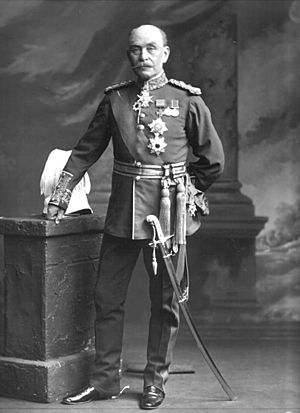O'Moore Creagh facts for kids
Quick facts for kids
Sir O'Moore Creagh
|
|
|---|---|

General Sir Garrett O'Moore Creagh
|
|
| Nickname(s) | Garrett O'Moore Creagh |
| Born | 2 April 1848 Cahirbane, County Clare, Ireland |
| Died | 9 August 1923 (aged 75) South Kensington, London, England |
| Buried |
East Sheen Cemetery
|
| Allegiance | United Kingdom |
| Service/ |
British Army British Indian Army |
| Years of service | 1866–1914 |
| Rank | General |
| Unit | 95th (Derbyshire) Regiment of Foot |
| Commands held | Commander-in-Chief, India 29th (DCO) Bombay Infantry (2nd Baluch Battalion) |
| Battles/wars | Second Anglo-Afghan War Boxer Rebellion |
| Awards | Victoria Cross Knight Grand Cross of the Order of the Bath Knight Grand Cross of the Order of the Star of India Venerable Order of Saint John Order of the Rising Sun (Japan) |
| Relations | Major General Sir Michael Creagh (son) |
General Sir Garrett O'Moore Creagh (born April 2, 1848 – died August 9, 1923) was a very important British Army officer. He was from Ireland and received the Victoria Cross. This is the highest award for bravery in battle. It is given to British and Commonwealth soldiers. He was also known as Sir O'Moore Creagh.
Growing Up and Joining the Army
Garrett O'Moore Creagh was born in County Clare, Ireland, on April 2, 1848. His father, James Creagh, was a Captain in the Royal Navy. His mother was Grace O'Moore.
Creagh was married twice during his life. He had three children. One of his sons, Sir Michael Creagh, also became a Major General.
In 1866, after training at the Royal Military College, Sandhurst, Creagh joined the 95th (Derbyshire) Regiment of Foot. In 1869, he was sent to India. The next year, he joined the British Indian Army.
Bravery in the Second Anglo-Afghan War
When he was 31 years old, Creagh was a captain in the Bombay Staff Corps. This was during the Second Anglo-Afghan War. On April 22, 1879, something very brave happened at Kam Dakka, in Afghanistan. For this act, he was given the Victoria Cross.
Here is what happened:
- On April 21, Captain Creagh and 150 of his soldiers were sent to protect Kam Dakka village.
- The next morning, about 1,500 enemy fighters attacked them.
- The people of Kam Dakka also joined the enemy.
- Captain Creagh had to move his soldiers out of the village.
- He found a cemetery nearby and made it a strong place to defend.
- He and his men fought off the enemy many times with bayonets.
- They held their ground until three in the afternoon.
- Then, more soldiers arrived from Dakka to help them.
- The enemy was finally pushed back.
- They were then charged by a troop of soldiers and many were forced into the river.
- The Commander-in-Chief in India said that Captain Creagh's calm, strong will, and great bravery saved his soldiers. Without him, they likely would have been defeated.
A Distinguished Military Career
In 1878, Creagh became a captain of the Merwara battalion. He led them from 1882 to 1886. In 1890, he took command of the 29th (Duke of Connaught's Own) Bombay Infantry. He was promoted to Assistant Quarter-master General in 1896.
Creagh led the Indian soldiers during the Boxer Rebellion in China in 1900. In July 1901, he became the General Officer Commanding the British Force in China. He stayed in China for several years. He was made a Knight Commander of the Order of the Bath (KCB) in 1904. On December 11, 1907, he was promoted to general. That same year, he became the Military Secretary to the India Office.
In 1909, Creagh took over from Lord Kitchener as the Commander-in-Chief, India. He retired in 1914. During the First World War, he worked as a military advisor. He helped the Central Association of Volunteer Training Corps.
Sir Garrett O'Moore Creagh passed away in London on August 9, 1923. His Victoria Cross medal is kept at the National Army Museum in Chelsea, London, England.

